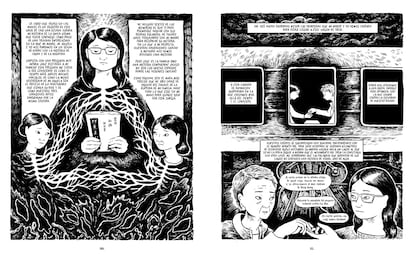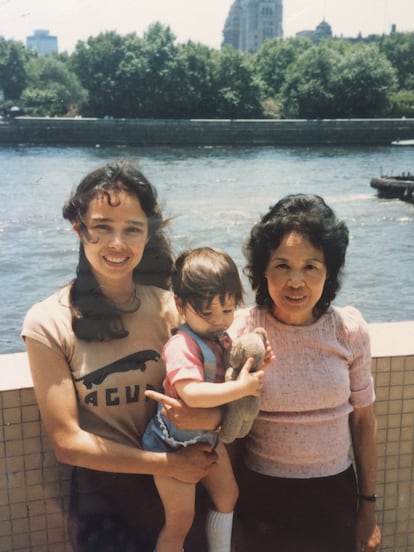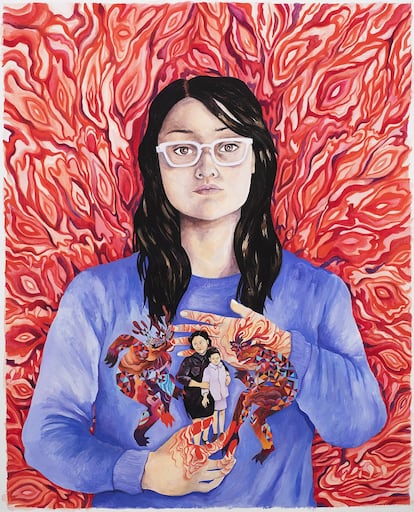When cruise ships dock in Juanau, capital of Alaska, the invasion of tourists makes the fragile internet signal become unstable for its neighbors. Therefore, Tessa Hulls had to find out last Monday from the mouth of someone Feed ghosts, His debut in the graphic novel, he had just become the second comic in history to win a Pulitzer award. He did it in the same category, that of autobiographical literature, which conquered the comic in 1992 MausArt Spiegelman’s masterpiece from his father’s memories, a holocaust survivor.
Hulls was working as a cook at the Juanneau Capitol. It is a seasonal job; It lasts what the legislative session in the state parliament and allows, he says, “to move away from the fatigue of being freelance And of that feeling of being constantly building the ship in which you navigate. ”It was a congressman who warned it of an award, endowed with $ 15,000, which he did not expect. He barely had time to assimilate the news: there were still many snacks to prepare.
Feed ghosts He has not stopped accumulating comics awards since it was published a year in English (Spanish resulted last February), but the pulitzer It is something else, because there it competed with autobiographies and memoirs to use, works of an allegedly greater genre. The jury considered the graphic novel, of almost 400 pages – Llenes of dense drawings in black and white, quotes and narrative findings – such as “a moving work of literary art whose illustrations give life to (…) the experience of the trauma that travels through family stories.”
In it, Hulls climbs through the family tree to investigate in his past and in the history of China, where his grandmother and mother were born. Sun Yi is the grandmother, a modern Shanghai journalist who escaped Hong Kong as a single mother and published in 1957 a successful memory about her years under the written Mao yoke of a pull in three months and in a state of febril paranoia. Then he went into a sanatorium. “He lost his head and didn’t find her again,” writes his granddaughter.
The mother is called Rose. After studying in an elite school for European expatriates, the family was taken in 1970 to the United States. In 1985, he had Tessa, who grew up in a tiny town in northern California with the “ghost” always present of the grandmother, who would die in 2012. “(He was) a spectrum of 40 kilos,” writes Hulls, “which swarmed through the house with a gray costco pants.” Not only did the madness separated, but also the language: the granddaughter never learned Mandarin, and as a teenager, she tells in the comic, he shouted, as things are said at that age, “being American instead of China.”
His idea to undertake the project was to address the fractured relationship between his mother and grandmother with the twentieth century in the background. “I thought it would be enough to learn a little history of Maoism,” the author explained on Friday in an interview by videoconference from Juneau. It was when translating Sun Yi’s memory and read it for the first time when the thing changed. “I realized that it would be something much richer and more complex.”
Study Mao
He spent the first four years “investigating.” Not only had to learn history and some Chinese, but also how a graphic novel is made, because something was clear from the beginning: that this would be the language that required its history. In the end, he reached another conclusion: he does not plan to publish another book.
When it started with Feed ghosts, Hulls was not even interested in the comic as a medium. He had dedicated himself primarily to painting, in which he has an absent colorist style in his graphic novel. Also, to run the most varied adventures: work as a cook in Antarctica, paint murals in Ghana or cover by bicycle the 5,000 kilometers that separate the south of California de Maine to flee from an imminent marriage.
“As a child, I loved Calvin and Hobbes’s comics, they were the ones who made me want to be an artist,” says Hulls. With Fun Home, unforgettable graphic novel with which Alison Bechdel adjusted accounts with his father, saw for “first time the potential of the format.” “I had already turned 30 when I devoured in just a couple of years the comics of a lifetime to try to understand their rules.”

In addition to comics, Hulls read all the Chinese history books he found, “as well as all the books that appeared in the bibliography of those books.” He also came into contact with experts, historians and journalists, who helped him with the comic, which incorporates notes at the end as if it were an essay.
The effort to understand is guessed: The result can also be read as a lesson about the convulsive twentieth century in China and Hong Kong. Hulls are enough for a handful of thorough drawings to effectively count the great leap forward of Mao or the life of the Euroasy community of six decades ago in the British colony, which he investigated to understand the reasons for his grandfather, a Swiss diplomat that abandoned his grandmother after leaving her pregnant.
The writing and drawing process, for which he consumed “about 80 Japanese brushes with Nylon tip”, took another four years, and that includes the six months he spent isolated in a cabin in the middle of a forest in Oregon thanks to the scholarship of a residence for writers. “There I found the structure of the story,” he recalls.
In Are you my mother? The comic that followed the phenomenal success of his best known work, Bechdel also wrote about his parent while he still lived. “It shows that it was afraid to reach the level of honesty that that book would have required to be as relevant as Fun Home”, explains Hulls. “His example helped me to know what I shouldn’t do.”

Like that novel graphic, Feed ghosts It is also (or above all) the story of a maternal-infilial relationship, with all its arc of guilt, reproach and reconciliation. Together they traveled to China already Hong Kong as part of Hulls’s investigation, and her mother was present, says the daughter, throughout the process. “I was worried to hurt her, and in the successive revisions I dedicated myself to adding layers of compassion. I did not want to teach her the result until I was finished. The penalty is that when that moment arrived, the dementia had already taken over her,” laments the author, who in the book is often drawn like a cowboy That, writes, is only due to the “appetite by the border.”
That indomiting spirit, which has taken the six continents and to fix his home between Seattle and Alaska, justifies it for the fact of having grown up in a small town “in the midst of nowhere”, seeing everything through the lens of one of her mother’s favorite phrases: “I do not understand the United States.” Nor did he help the lack of referents and invisibility of Asian culture on television and cinema of the time. Only recently the dominant narrative has accomplished in this country to that different look with successful products such as the Oscarized All at once everywhere, Another story about the relationship between a mother and a Chinese-American daughter and one of Hulls’s favorite films, which cannot avoid crying, confesses, every time he sees her.
That canon opening has also brought a “huge and cruel reaction”, especially from the environment of Donald Trump. “They are people,” considers the cartoonist “who see as a threat the collapse of the American white model.” His study of Maoism, he adds, has given him “context to understand what is happening in the United States.” “The eagerness (from Trump) for pursuing and prohibiting certain words is very similar to what the communists did in China when they came to power: to ignore reality and try to impose a narrative.”
To the question of whether winning the pulitzer He has changed his mind about his withdrawal, Hulls was blunt, unfortunately from his editors (MCD, in English; Reservoir Books, in Spanish): “I will not publish another book again. Writing this made me understand the difference between being an author and multidisciplinary artist. I am the second.”

It is formed that the award takes to Spiegelman, with which he shares from Monday in one of the most exclusive pantheons of the Pulitzer, to read Feed ghosts, because he considers that “he talks with Maus at many levels. ”His admission to the select club from some primarily associated awards with the great American journalism may help him in his following adventure: he wants to devote himself to reporting in comics, and do it from Alaska, where“ many things are happening in the complicated intersections between climate change, environmental justice, indigenous sovereignty and extraction of natural resources ”.
Until that is possible, you will continue to prepare snacks for the congressmen of that state.

